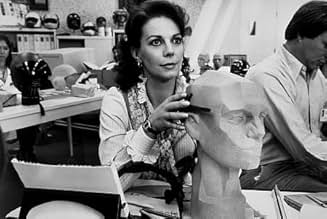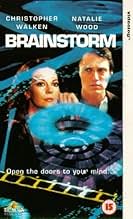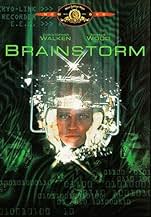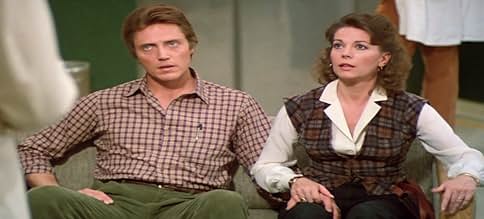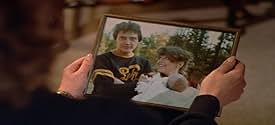Brainstorm
- 1983
- Tous publics
- 1h 46min
Des chercheurs mettent au point un système leur permettant d'entrer dans l'esprit des gens. Mais lorsque les problèmes personnels des gens impliqués entrent dans l'équation, cela devient dan... Tout lireDes chercheurs mettent au point un système leur permettant d'entrer dans l'esprit des gens. Mais lorsque les problèmes personnels des gens impliqués entrent dans l'équation, cela devient dangereux - voire mortel.Des chercheurs mettent au point un système leur permettant d'entrer dans l'esprit des gens. Mais lorsque les problèmes personnels des gens impliqués entrent dans l'équation, cela devient dangereux - voire mortel.
- Réalisation
- Scénario
- Casting principal
- Récompenses
- 2 victoires et 6 nominations au total
- Barry
- (as David Wood)
- Realtor
- (as Mary-Fran Lyman)
Avis à la une
The film is caught in odd Catch 22 - much of its technology has been both long since been surpassed (the Mylar tape & laser show!), and, in other areas, not reached yet - true emotions and sensations transmitted via VR. As expected from Trumbull, the special effects are solid if not as spectacular as his work on 2001, BLADE RUNNER and CLOSE ENCOUNTERS. Originally conceived as a feature film test for his high frame rate Showscan process, Trumbull had to settle for 70mm and a wider aspect ratio for it's VR scenes. There is no question that true Showscan would have made for a more impressive visual experience, even if only in limited locations.
Douglas Trumbull is one of cinema's true visionaries, but a smooth accomplished Director he wasn't. As in SILENT RUNNING, the ideas and visuals outstrip his ability to do them full justice. Still, BRAINSTORM has more solid ideas than 99% of SF films even attempt. The film's love for Science, from the gadgets to the photos of Einstein, to the self-sacrifice of the wonderful Louise Fletcher, this is a movie that celebrates the world of knowledge. And, damn, Christopher Walken that off-the-wall even then!!?? Sadly, poor Natalie Wood looked very tired (her death during filming cast a pall over its release). Cliff Robertson is decent as the head of the experimental lab. Still, it is Fletcher who becomes the heart and literal soul of the production. Her Lillian Reynolds is an exceptional depiction of the dedicated scientist who lets no obstacle get in the way of her pursuits. It is because of Fletcher and the film's concepts that makes the film endure, whatever its flaws.
Christopher Walken and Louise Fletcher star as Michael Brace and Lillian Reynolds, two old- fashioned mad scientists working to perfect a virtual reality device that records human experiences. It can allow you to taste what somebody else is eating, for example, or feel what it was like for them as they rode a roller coaster. The people funding and backing Brace & Reynolds ultimately don't like the way they do things, and try to alter the course of the research. Michael becomes obsessed with checking out a tape made by Lillian, and figures out a way to sneak past the defenses of the computer program running the show.
Overall, this is an amusing show, with solid acting by all concerned. Fletcher is indeed a standout. "Brainstorm" is notable for being the last credit for co-star Natalie Wood (who isn't given very much to do), whose untimely death occurred during production. Supporting cast members include Cliff Robertson, a likable Joe Dorsey ("Grizzly"), and a young Jason Lively ("Night of the Creeps") as Walken and Woods' son. (Walkens' real-life spouse Georgianne, who usually works as a casting director, appears on screen here as Dorseys' wife.) The technical work on the film is of course first rate, with eye popping visual effects, effective production design, and a thunderous music score by James Horner.
Worth a look for fans of this genre.
Seven out of 10.
Most sci-fi films based on technology don't age well, and there are times where this is no exception. The idea of recording on tape, let alone making tape loops, must seem like wax cylinder recordings to today's MP3 generation. The tapes themselves were props borrowed from a film being shot nearby, and that film was itself a dismal failure. But the concept is timeless, and so well done that, all in all, the film still works as well as it did in 1983.
Lesser screenplays would have been content with the main story line; scientists invent a way to record brainwaves and play them back for a real life out of body experience, and for just such a stinker, check out Strange Days. But then along comes the incomparable, utterly fabulous Louise Fletcher, who, as one of the co-inventors of the aforementioned device, records her death when she suffers a heart attack while working late one night. For the rest of the film, people are either trying to play the tape or prevent others from playing it. Meanwhile, the technology gets hijacked by two-dimensional government lackeys trying to exploit the weapons potential of the invention.
One can easily pick out scenes of this movie to vilify or exalt, all these years later, and any object viewed over time eventually has a vanishing point. The almost slapstick scene where the assembly robots go berserk is one example of a scene that, while consistent with its contemporaries, is silly today. The death scene, though much maligned, is equally misunderstood, and provides the metaphysical underpinnings that elevate Brainstorm above mere gadget flicks. Brainstorm is about exploring experience, life, love, even death, from the point of view of others, and Academy Award winner Louise Fletcher allows us to do so through her consummate skill in presenting a death scene of sufficient awe and wonder to warrant exploration.
If you want to find out what else happens, watch the film, but when you do, don't ignore the beautiful, delicate interplay between Christopher Walken and Natalie Wood. Their careening relationship seems somehow tied to the invention they helped make, and there are sequences so beautiful that I sometimes take out the DVD just to marvel at them.
Despite changing styles in special effects, this is a timeless and beautiful story that transcends the genre and, with Walken, Wood and Fletcher, becomes more than just a story about shiny gold tapes that record brain waves. It's more about immovable objects and irresistible forces and what happens when they collide. Intrigued? Good. Go watch it.
Watch it as an experience rather than as a scientific treatise and you will surely have a great ride.
The "recorded memory" sequences were even more vivid for us in Indianapolis who saw it at the Eastwood theatre. The Eastwood had one of the few curved Cinerama roadshow screens outside of New York and Hollywood's Cinerama Dome. Think of it as a smaller version of an Omnimax screen. Sitting in the front row, you were completely enveloped by the film, and the visual and audio effect when the "memory" sequences lit up were quite attention grabbing. Trumbull was at this time working on his ill-fated Showscan process for amusement park rides, and was very interested in audience perceptions of diffrent lenses and frame rates. Some of this is used in Brainstorm. It's just not the same on a TV set of any size.
The central core of the story - the recording of the death of Lillian and Michael's obsession to experience it - is a disturbing one, because it explores the very nature of life and death. It can satisfy or dissappoint, because Trumbull has put his vision of memory, experience, death and afterlife on film for everyone to take pot shots at. And they did. It's a shame, because the film is beautiful, thought provoking, and ingenious. Yeah, I know, it has all of that evil government plot boilerplate. Look past it.
(It even revels in the quirks of the researchers, showing the second thing everybody does with new technology is use it for porn.)
Le saviez-vous
- AnecdotesBecause of the immensely troubled production and disagreements with MGM, Douglas Trumbull opted never to direct a Hollywood film again. In 1983 he stated, "I have no interest . . . in doing another Hollywood feature film . . . Absolutely none. The movie business is so totally screwed-up that I just don't have the energy to invest three or four years in a feature film. Moviemaking is like waging war. It destroys your personal life, too. The people who can survive the process of making films have largely given up their personal lives in order to do that, just because it's such a battle to make a movie. And in doing that, they've isolated themselves from the very audience that they're trying to reach."
- GaffesSeveral of the tapes play back from a third-person perspective, which would be impossible if the tapes were actually a person's recorded memory.
- Citations
Dr. Michael Anthony Brace: I made that for you. It's a gift.
[hands her the tape and sets the large silver metal case on the bed]
Karen Brace: What is it?
Dr. Michael Anthony Brace: It's me.
- Crédits fousAfter the final credit has rolled, 'TO NATALIE' appears for a couple seconds
- Versions alternativesIn the psychotic episode sequence when Michael's (Christopher Walken) son Chris (Jason Lively) wears the headset, there's a slight difference between the 70mm version and 35mm version. In the 70mm version of Chris's hallucination when Michael flips a lever presumably sending an electrical current to Chris's head, the camera cuts to and remains on a shot of a circular device with electricity running through it, as Michael is heard to say, 'Now you're gonna find out it's mine!' In the 35mm version, the shot arrangement is the same except that it cuts back to a closeup of Michael saying the line 'Now you're gonna find out it's mine!'
- ConnexionsEdited into Trumbull Land (2018)
Meilleurs choix
Détails
- Date de sortie
- Pays d’origine
- Langue
- Aussi connu sous le nom de
- Proyecto Brainstorm
- Lieux de tournage
- Research Triangle Park, Caroline du Nord, États-Unis(Burroughs Wellcome Pharmaceutical Corporation HQ)
- Sociétés de production
- Voir plus de crédits d'entreprise sur IMDbPro
Box-office
- Budget
- 15 000 000 $US (estimé)
- Montant brut aux États-Unis et au Canada
- 10 219 460 $US
- Week-end de sortie aux États-Unis et au Canada
- 1 196 965 $US
- 2 oct. 1983
- Montant brut mondial
- 10 219 460 $US
- Durée
- 1h 46min(106 min)
- Couleur



